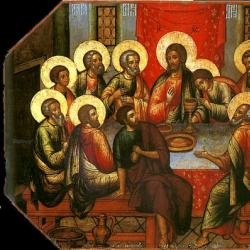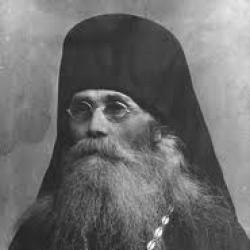Leskov the man on the clock to read completely brief. "The Man on the Clock": the heroes of the story (brief description)
Nikolay Leskov
Man on the clock
The event, the story of which is brought to the attention of readers below, is touching and terrible in its significance for the main heroic face of the play, and the denouement of the case is so original that something like it is hardly even possible anywhere except in Russia.
This is partly a courtly, partly a historical anecdote, not badly characterizing the manners and trend of a very curious, but extremely poorly marked era of the thirties of the nineteenth century.
There is no fiction in the upcoming story at all.
In the winter, around Epiphany, in 1839, there was a strong thaw in St. Petersburg. The weather was so wet that it was as if it were spring: the snow was melting, drops fell from the roofs during the day, and the ice on the rivers turned blue and took on water. On the Neva, in front of the Winter Palace, there were deep polynyas. The wind was blowing warm, westerly, but very strong: water was rushing in from the seaside, and cannons were firing.
The guard in the palace was occupied by a company of the Izmailovsky regiment, commanded by a brilliantly educated and very well-placed young officer, Nikolai Ivanovich Miller (* 1) (later a full general and director of the lyceum). He was a man with a so-called "humane" direction, which had long been noticed behind him and slightly harmed him in the service in the attention of higher authorities.
In fact, Miller was a serviceable and reliable officer, and the palace guard at that time did not represent anything dangerous. The time was the quietest and most serene. Nothing was required of the palace guard, except for the exact standing at their posts, and meanwhile, just here, on the guard line of Captain Miller at the palace, a very extraordinary and disturbing incident occurred, which few of the then contemporaries living out their lives now barely remember.
At first, everything went well in the guard: posts were distributed, people were placed, and everything was in perfect order. Sovereign Nikolai Pavlovich was healthy, went for a drive in the evening, returned home and went to bed. The palace also fell asleep. The calmest night has come. There is silence in the guardhouse (*2). Captain Miller pinned his white handkerchief to the high and always traditionally greasy morocco back of the officer's chair and sat down to pass the time with a book.
N.I. Miller was always a passionate reader, and therefore he did not get bored, but read and did not notice how the night was drifting away; but suddenly, at the end of the second hour of the night, he was alarmed by a terrible anxiety: in front of him was a non-commissioned officer for divorce, and, all pale, seized with fear, murmured quickly:
Trouble, your honor, trouble!
What's happened?!
A terrible misfortune has befallen!
N.I. Miller jumped up in indescribable anxiety and could hardly find out what exactly the "trouble" and "terrible misfortune" consisted of.
The case was as follows: a sentry, a soldier of the Izmailovsky regiment, by the name of Postnikov, standing on the clock outside the current Jordanian entrance, heard that in the wormwood that covered the Neva in front of this place, a man was pouring and desperately praying for help.
Soldier Postnikov, from the yard of the master's people, was a very nervous and very sensitive person. For a long time he listened to the distant cries and groans of a drowning man and came to a stupor from them. In horror, he looked back and forth at all the expanse of the embankment he could see, and neither here nor on the Neva, as luck would have it, did he see a single living soul.
No one can give help to a drowning man, and he will certainly flood ...
Meanwhile, the drowning man struggles terribly long and stubbornly.
It seems to him one thing - without wasting strength, go down to the bottom, but no! His exhausted groans and invocative cries either break off and fall silent, then again begin to be heard, and, moreover, closer and closer to the palace embankment. It can be seen that the man is not yet lost and is on the right path, straight into the light of the lanterns, but only he, of course, will still not be saved, because it is here, on this path, that he will fall into the Jordanian hole. There he dived under the ice, and the end ... Here again it subsided, and after a minute it rinsed again and groaned: "Save, save!" And now it’s so close that you can even hear splashes of water, how it rinses ...
Soldier Postnikov began to realize that it was extremely easy to save this man. If now you run away to the ice, then the sinking one will certainly be right there. Throw him a rope, or give him a six, or give him a gun, and he is saved. He is so close that he can grab his hand and jump out. But Postnikov remembers both the service and the oath; he knows that he is a sentry, and the sentry does not dare to leave his booth for anything and under any pretext.
On the other hand, Postnikov’s heart is very recalcitrant: it whines, it beats, it freezes ... Even if you tear it out and throw it under your own feet, it becomes so restless with these groans and cries ... It’s terrible after all, to hear how another person is dying, and not to give help to this dying person, when, in fact, there is a full opportunity for this, because the booth will not run away from the place and nothing else harmful will happen. "Or run away, eh?
For one half hour, while this lasted, the soldier Postnikov was completely tormented by his heart and began to feel "doubts of reason." And he was a smart and serviceable soldier, with a clear mind, and he perfectly understood that leaving his post was such a fault on the part of the sentry, which would immediately be followed by a military court, and then a race through the ranks with gauntlets and hard labor, and maybe even and "execution"; but from the side of the swollen river the groans again float nearer and nearer, and murmuring and desperate floundering can already be heard.
T-o-o-well! .. Save me, I'm drowning!
Here, right now, there is the Jordanian hole... The end!
Postnikov looked around once or twice in all directions. There is not a soul anywhere, only the lanterns are shaking from the wind and flickering, and along the wind, interrupted, this cry flies ... perhaps the last cry ...
Here is another splash, another monotonous cry, and the water gurgled.
The sentry could not stand it and left his post.
Postnikov rushed to the gangway, fled with a beating heart onto the ice, then into the flooding water of the polynya and, soon examining where the flooded drowned man was struggling, handed him the stock of his gun.
The drowning man grabbed the butt, and Postnikov pulled him by the bayonet and pulled him ashore.
Winter in St. Petersburg in 1839 was with strong thaws. Sentry Postnikov, a soldier of the Izmailovsky regiment, stood at his post. He heard that a man had fallen into the hole and was crying for help. The soldier did not dare to leave his post for a long time, because this was a terrible violation of the Charter and almost a crime. The soldier suffered for a long time, but in the end he made up his mind and pulled out the drowning man. Just then a sleigh was passing by, in which an officer was sitting. The officer began to understand, and in the meantime Postnikov quickly returned to his post. The officer, realizing what had happened, delivered the rescued man to the guardhouse. The officer reported that he had saved a drowning man. The rescued person could not say anything, because he had lost his memory from what he had experienced, and he did not really understand who was saving him. The case was reported to Lieutenant Colonel Svinin, a diligent campaigner.
Svinin considered himself obliged to report to Chief Police Officer Kokoshkin. The case received wide publicity.
The officer who pretended to be a rescuer was awarded a medal "for saving the dead." Private Postnikov was ordered to be whipped before the formation with two hundred rods. The punished Postnikov was transferred to the regimental infirmary in the same overcoat on which he was flogged. Lieutenant Colonel Svinin ordered the punished man to be given a pound of sugar and a quarter of a pound of tea.
Postnikov replied: "I am very pleased, thank you for the father's mercy." In fact, he was pleased, sitting for three days in a punishment cell, he expected much worse that a military court could award him.
You have read the summary of the story On the clock. We bring to your attention the section of our website Summary, where you can read more statements by famous writers.
- Text for the reader's diary
- The main idea of the story
- Summary
- Summary by chapter
Leskov Man on the clock for the reader's diary
Soldier Postnikov was standing guard when he heard a call for help. He kept thinking and pondering whether he should leave his post and see who was in trouble, or in any case should he remain in the service? Postnikov saves a man drowning in the river and immediately returns. The victim is taken away by a disabled officer. Postnikov was punished for his absence during the service. He is sent to the punishment cell.
A lot of high-ranking officials were involved in history so that it would not become known to the sovereign. The police chief, after interrogating the disabled officer and the rescued one, decides to reward the officer. He receives a medal for a good deed. A completely different fate awaits the poor soldier. They pulled him out of the punishment cell, but he received two hundred lashes. For the soldier, this punishment was not very terrible, since he was waiting for the worst decision. The priest learns about the whole truth. He concludes that lashing was a better solution for the soldier than his exaltation and praise.
The main idea of Leskov's story The Man on the Clock
Human moral duty is always above all else, even if a person himself may suffer because of the right deed.
The action begins with a description of warm weather in the middle of winter. At Epiphany in 1839, the weather was strangely warm. It was so warm that the ice on the Neva began to melt. One soldier, who that day was a sentry in the Izmailovsky regiment, heard strange human screams and cries. Someone called for help. The soldier's name was Postnikov. He did not know what to do, because he could not leave his place of guard, and the man kept calling for help. He decided to run to see what was going on. The voice came from the river. Postnikov saved a drowning man by pulling him out with a gun. The life of the poor man was still in danger, because he was very cold and completely weak. At that moment the soldier saw an officer in a wheelchair. He immediately returned to the guard. The officer picked up the drowning man and, imagining himself a savior, took him to a moving house.
Several minutes of Postnikov's absence did not remain secret. His absence was noticed and sent immediately to Officer Miller. Postnikov was put in a punishment cell. Because of the fear that the sovereign might find out about everything, the commander was forced to turn to officer Svinin for help. It got to the point where a lot of people were involved. After turning to Svinin, it was decided to ask the chief police chief Kokoshkin for advice. The latter decided to take a decisive step.
First of all, he considered it necessary to meet with the disabled officer himself and with the man whose rescue caused such a stir among numerous dignitaries. The disabled officer and the drowning man were thoroughly interrogated. As a result of this interrogation, the police chief became aware that, apart from the sentry, no one else had an idea about what had happened, and that he was the only witness to the whole story of salvation. The disabled officer again acted as a savior. This time his feat was appreciated as it should be. He was awarded a medal designed for similar stories, when one saves the life of another person.
The real savior was in the punishment cell all this time. He had already managed to change his mind in his thoughts and try to predict any course of events. His reward for saving a poor dying man was a punishment, namely, to receive two hundred lashes with a rod. After his punishment, the soldier was nevertheless very pleased with Svinin's decision, since much more serious rewards came to his mind than the blows he received with a rod. The priest became aware of this story. He thought about what had happened and concluded that it was better to punish a soldier for such a feat than to exalt him. So there will be more benefits.
Summary The man on the clock chapter by chapter (Leskov)
Chapter 1
Chapter 2
This touching story happened in the winter in St. Petersburg. On guard in the palace was a company commanded by officer Nikolai Miller. He was a very reliable and humane person.
Chapter 3
The night was quiet and calm, Officer Miller whiled away the time reading a book. Suddenly, they report to him that something bad has happened.
Chapter 4
It turned out that sentry Postnikov, who was on guard, heard a cry for help from a drowning man. Being a very sensitive person, he left his post and went to the aid of a drowning man.
Chapter 5
Soldier Postnikov rushed to the ice and pulled the man out of the water. At that moment, a sleigh pulled up to them. In them sat a frivolous and impudent officer. He took the rescued man and took him to the police. At the station, wanting to receive a reward, he said that he had saved a drowning man.
Chapter 6
Soldier Postnikov reports to Miller about what happened. Miller understands that all commanding persons are in danger, and the soldier cannot avoid serious punishment. He sends a note about the incident to his commander Svinin.
Chapter 7
Lieutenant Colonel Svinin valued his place in the service very much. He did not tolerate violations of service and was in this regard a strict and inexorable person.
Chapter 8
As soon as the lieutenant colonel read the note from Miller, he immediately went to interrogate the soldier Postnikov. After the interrogation, being in a state of anger and despair, he sent the soldier under arrest to the punishment cell. Then Svinin began to think about how to hide what had happened from the king.
Chapter 9
Lieutenant Colonel Svinin decides to go to General Kokoshkin. He knows that this person will help to get out of any situation so as not to anger the king.
Chapter 10
Kokoshkin listens to Svinin's story and calls the bailiff, who received the rescued man at night, and the officer who supposedly saved the man.
Chapter 11
They come to Kokoshkin together with the rescued person. Kokoshkin conducts a conversation with the rescued. He understands that he does not remember the face of the man who saved him. Kokoshkin assures the rescued that the officer who brought him to the station is his savior.
Chapter 12
Kokoshkin promises to present an award to the officer who supposedly saved the man. Thus, he wants to get out of the current unpleasant situation. He understands that now no one will know that the soldier left the post and saved the man.
Chapter 13
Kokoshkin presents the medal to the liar. Svinin feels relieved, he orders Miller to release the soldier Postnikov and punish him with rods in front of the soldiers.
Chapter 14
Miller asks to spare the soldier, but the lieutenant colonel demands to follow the order. Postnikov is released, whipped and sent for treatment.
Chapter 15
Svinin visits a soldier in the infirmary and orders him to give him sugar and tea. The soldier thanks him for the treats. He was pleased with this outcome of events, as he was counting on a worse punishment.
Chapter 16
Rumors and fictitious tales about the feat of the soldier Postnikov begin to spread around the capital. The St. Petersburg Bishop, to whom these stories have also reached, wants to find out how everything really happened.
Chapter 17
Somehow, Vladyka meets with Svinin and learns the whole truth about the incident. Svinin complains that his conscience torments him because another person received the award, and the soldier was punished with rods. Vladyka assures him that he did everything right.
Chapter 18
Picture or drawing Man on the clock

Other retellings for the reader's diary
- Summary The fourth height of Elena Ilyina
The book is based on real events, which tells about a girl who was able to achieve a lot in a short time of her life. The first pages of the work show us the fate of a simple family living in Moscow.
/ "The Man on the Clock"
Chapter 1
The reader will learn that the events that will be displayed in the following chapters of the story really took place and reflected the mores of the thirties of the nineteenth century.
Chapter 2
Petersburg 1839. Nicholas I lives in the Winter Palace. Epiphany winter with an unexpected thaw. The snow began to melt, the ice on the Neva turned blue and covered with water.
The emperor's palace is guarded by sentries of the Izmailovsky regiment under the command of a young and educated officer Nikolai Ivanovich Miller. Miller was a man, as it was called at that time "humane direction", which interfered with his service a little, but he was also a reliable person. It was the quietest time at that time. Nothing was required from the guards, only a clear standing at their posts. And at such a time, an extraordinary event happened, as for the military people of that time.
Chapter 3
At the beginning of the guard, everything was normal, people were placed at their posts, the order was not violated. Emperor Nicholas was the first to go to bed. The whole Winter Palace also fell asleep. Captain Miller sat reading a book, oblivious to how the night passed. But suddenly, after two hours, a non-commissioned officer unexpectedly comes to him and, not remembering himself, quickly informs him that something terrible has happened.
Chapter 4
Captain Miller could hardly make out the non-commissioned officer's babble. It turned out that at night, while standing at the post, a soldier of the Izmailovsky regiment, Postnikov, heard a cry for help coming from the hole that covered the Neva, and located just opposite the post. The soldier Postnikov was very sensitive, and on top of that, he was also nervous. He, hearing the screams, became numb himself and did not know what to do. Realizing that a person was not far away, it would not be difficult for him to save a person, but by saving another, he could destroy himself. According to the charter, he was not allowed to leave his post. He fought the call of duty and human compassion. The latter took over and Postnikov, leaving the post, runs to the river.
Chapter 5
A soldier saves a drowning man. At the same time, a sleigh with a court officer of the disabled team was passing by. He takes the man saved by Postnikov to the moving house of the Admiralty unit. A completely wet soldier runs to his post. Arriving at the bailiff, the impudent officer made a statement that it was he who saved the man. And the drowning man was frightened into unconsciousness and did not remember his true savior. He was looked after by a police paramedic, and, according to the officer, a protocol was drawn up in the office, moreover, they could not understand how, saving a man, the officer came out dry from the hole. Since the cunning court officer had a great desire to receive the medal "For the salvation of the perishing", he came up with a vague explanation about the reason for his dry uniform.
Chapter 6
Soldier Postnikov frankly confessed everything, and was removed from his post. They did not know what happened next with the rescued person and the act of the officer on guard at the palace. Captain Miller, sensing danger, urgently writes an alarming note to his battalion commander, Lieutenant Colonel Svinin, and asks him to urgently come to them to help in this situation.
Chapter 7
Lieutenant Colonel Svinin was not as pitiful as Captain Miller, but he could not be called heartless either. At that time, such people were called "servicemen", which meant his strict attitude to official duties. He was a hardened careerist, and valued his career, trying not to allow any violations in the service.
Chapter 8
Lieutenant Colonel Svinin arrived at the Zimny guardhouse, and, making sure that the note was written the truth, talks with Postnikov, and sends him under arrest to the punishment cell. Angry at Miller for his "humanism". He thinks how to find a way out of a very difficult situation.
Chapter 9
Svinin decides to go to the chief police officer Kokoshkin, who inspired fear in himself, but at the same time was a tactful person, and could do a lot if he wanted.
Chapter 10
Svinin came to Kokoshkin at five o'clock in the morning and told him about the incident with the soldier Postnikov. General Kokoshkin listened attentively to him, without showing any emotion, and Svinin decides that he already knew everything, since the incident did not alarm him. But the lieutenant colonel did not know that the bailiff, after talking with the disabled officer and with the rescued drowning man, did not attach such importance to this case as to immediately run to the chief of police. He realized that the disabled officer just wanted to get a medal, and since he was dry, he had doubts that it was he who was saving. Plus, he was not very pleased that the incident occurred on his site, and the drowning man was saved not by a policeman, but by a palace officer. Kokoshkin sends for the bailiff, who ordered him to immediately come to him along with the officer and the rescued man. Svinin remains to wait for everyone in the waiting room.
Chapter 11
Svinin comes to the general together with the bailiff, the officer and the rescued. In the course of the conversation, it turned out that the rescued did not know exactly, because of fear and unconsciousness, who pulled him out of the hole, and the general makes him believe that it was the officer who saved him. The chief police chief releases the rescued man.
Chapter 12
Kokoshkin, talking with the officer, pretends to believe in his noble deed, and forces the officer, while promising him a reward, to testify that when rescuing a drowning man, the officer was himself and did not see anyone around, which is recorded in the protocol. Hearing about the award, the officer simply lit up with happiness. The general releases him. In this way, he saves everyone from inevitable punishment.
Chapter 13
The next day, General Kokoshkin presented the disabled officer with the medal "For Saving the Perishing" to the great joy of the recipient. Svinin became nervous and spent three days in bed. He asks Captain Miller to visit him. Talking to him, he enthusiastically praises General Kokoshkin, and orders the soldier Postnikov to be taken out of custody and punished in front of the whole ranks.
Chapter 14
Captain Miller stands up for Postnikov, but the inexorable Svinin demands punishment. After the execution, the unfortunate soldier in his overcoat is taken to the infirmary for treatment.
Chapter 15
Lieutenant Colonel Svinin, as if visiting Postnikov in the infirmary, is convinced that he was really punished, and gives him sugar and tea. And Postnikov was very grateful to him, since he expected the worst punishment for his salvation of a person.
Chapter 16
In St. Petersburg, various rumors spread about this story. Vladyka himself cannot understand how everything really happened.
Chapter 17
Svinin told Vladyka the truth. He is tormented by conscience due to the fact that he punished a soldier for his feat. Vladyka assured Svinin that he had done the right thing.
Wrote the story "The Man on the Clock" Leskov. The summary will introduce the reader to this work in just a couple of minutes, the original would have taken much longer to read.
The event of the story takes place in 1839, on Epiphany days. The hero of the work is a soldier Plotnikov. He guarded the palace of Tsar Nicholas, standing at his post.
"The Man on the Clock", Leskov
A brief summary can begin with a description of a tragic incident, which ended well as a result. Postnikov stood at his post in his booth. Suddenly he heard someone asking for help. It is important to mention that the weather in those days of January was warm, so not all of it was frozen, polynyas were visible on it. It was in such an ice-hole that the man who called for help fell through. This is how Leskov's book "The Man on the Clock" begins. The soldier struggled with himself for a long time. He was a kind person. On the one hand, a sense of duty fought in him, which did not allow him to leave his post. On the other hand, the soldier was tormented by pity for a man who could drown at any time. In the end, he made up his mind and ran to help. The soldier handed the butt of the gun to the drowning man and pulled it out. Then Postnikov carried him to the shore and handed him over to an officer who was passing by.
He decided to use this case to his advantage, took the drowning man to the police department and said that it was he, the disabled officer, who saved the man. Here is an interesting content Leskov came up with. The man on the watch at this time reported the incident to his immediate superior, Miller.

Management decides what to do
The officer ordered for the time being to send the soldier who left the post to the punishment cell, and he himself contacted his boss, battalion commander Svinin, to ask what to do in this case. He arrived at the guardroom and personally interrogated Postnikov. After that, he decided to go to his boss. This is how Leskov portrays negligent bureaucratic people in his story “The Man on the Clock”. The summary will tell about the further ups and downs of the heroes in modern language. After all, in the nineteenth century they spoke a little differently, so sometimes it is difficult to read the full text of the story, it will take more time.
Unfair reward and punishment
Svinin went to General Kokoshkin, his boss. He listened to the report and ordered the bailiff of the Admiralty unit to be brought to him, where they brought the drowning and disabled officer who delivered him there. He ordered to bring to him the one who was drowning. All the trinity did not arrive soon, since there were no telephones then, and orders were delivered by a messenger. During this time, the general managed to take a nap. It can be seen that with the help of many episodes in a negative light, the bureaucracy is portrayed in his work “The Man on the Clock” by Leskov. The summary comes to the final part.

The arrivals said that it was the officer who showed miracles of nobility and saved the man. The rescued man himself did not remember exactly who helped him and confirmed that it was probably an officer.
As a result, the pseudo-savior was awarded the medal "For the salvation of the perishing." The authorities decided to punish the true hero with two hundred blows of the rod. But Plotnikov was glad that he was not put on trial.






